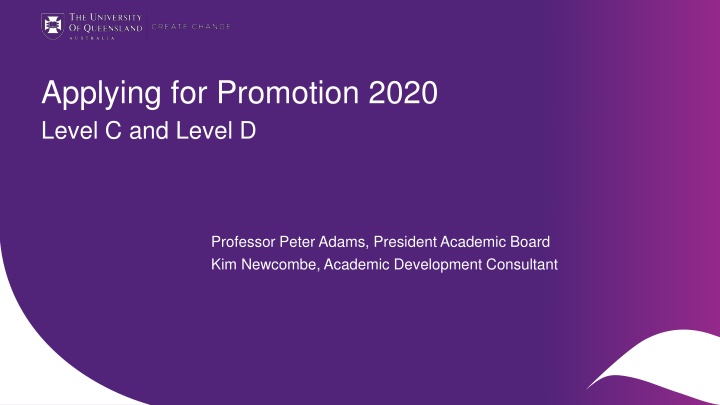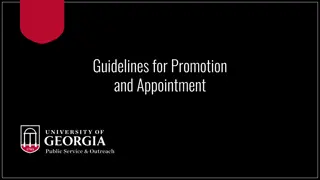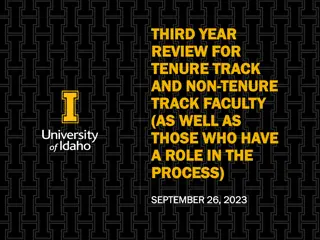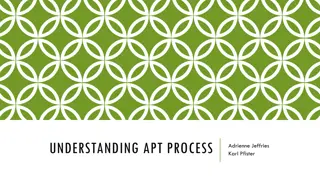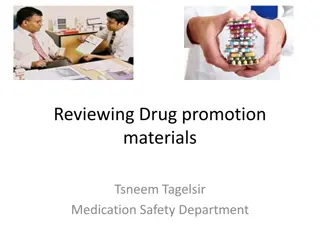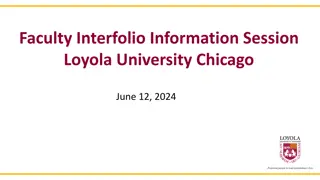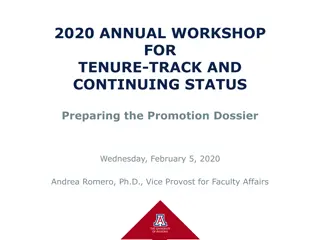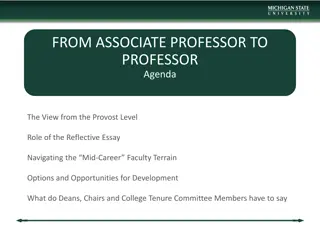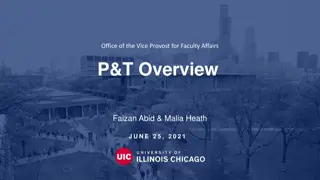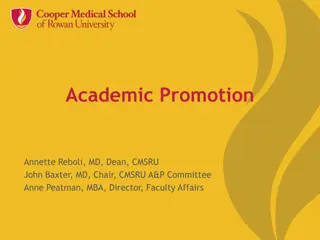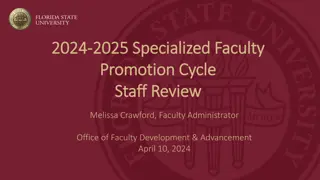Academic Promotion 2020: Level C and Level D - Application Process Updates
Major changes for the academic promotion process in 2020 include the elimination of mandatory referee reports, introduction of new assessment forms, and key information such as application dates and eligibility criteria. The promotion decisions are merit-based and transparent, with applications opening on April 1, 2020, and closing on June 30, 2020. Eligibility to apply is based on appointment date, unsuccessful past applications, research focus, and funding availability. Useful documents and guidelines are available for preparing a successful application.
Download Presentation

Please find below an Image/Link to download the presentation.
The content on the website is provided AS IS for your information and personal use only. It may not be sold, licensed, or shared on other websites without obtaining consent from the author.If you encounter any issues during the download, it is possible that the publisher has removed the file from their server.
You are allowed to download the files provided on this website for personal or commercial use, subject to the condition that they are used lawfully. All files are the property of their respective owners.
The content on the website is provided AS IS for your information and personal use only. It may not be sold, licensed, or shared on other websites without obtaining consent from the author.
E N D
Presentation Transcript
Applying for Promotion 2020 Level C and Level D Professor Peter Adams, President Academic Board Kim Newcombe, Academic Development Consultant CRICOS code 00025B
Overview 1. Major change(s) this year 2. Key information 3. Preparing your Application 4. Evidencing Achievement 5. Preparing for the Interview
Major change(s) this year Referee reports Committee will not call for referee reports as a matter of course. Committee may call referees if some aspect of your application requires external comment or clarification. You will be given an opportunity to identify up to three people you do not want to be contacted. As usual, you will be given the opportunity to respond to any negative referee comments.
Major change(s) for 2020 New Head/Director Assessment & Recommendation (Form D) The new forms will enable more specific feedback to be provided by the Supervisor and Head/Director, and align with changes that have occurred to processes for academic confirmation and promotion, including introduction of the Mid-term review process in 2019. These new forms supersede the existing: Assessment and Recommendation for Continuing Appointment and Promotion (Form D) Form D Assessment and Recommendation for Continuing Appointment and Promotion (Professorial) Faculty of Health and Behavioural Sciences Form H Head/Director Assessment and Recommendation
Key Information Merit based, Transparent and Fair process Promotion decisions made by Confirmation and Promotions Committee Key Dates Applications Open: 1 April 2020 Applications Close: 30 June 2020
Eligibility to apply Two years from: Date of appointment; or Most recent unsuccessful promotion application. Research Focused: Employment contract extends beyond promotion effective date Terms of funding permit promotion Guarantee of funding to cover increase in salary. Early applications permitted in exceptional circumstances
Useful documents Application & Document Sources Academic Promotion up to Level D PPL 5.70.17 Criteria for Academic Performance Guidelines for Evidencing Academic Achievement
Preparing your Application Consider: Why are you at UQ? What do you bring to the University? What are you known for? What is your trajectory? How do your aims and ambitions fit within the School and University? What sort of colleague are you? How can you demonstrate leadership (and/or how you are developing it)? Focus on contribution and evidence (not just activity)
Preparing your Application Seek Advice Mentors Senior staff Previous Committee members ITALI managed Peer Observation of Teaching Program People outside of your discipline Don t assume discipline specific matters are obvious! It is YOUR Responsibility to ensure that you make your case as clear as possible!
Preparing your Application University Strategic Plan University Student Strategy School Strategic Plan The University is not a static place, keep in touch with what is happening outside your school and outside UQ. Industry impact, cross disciplinary research, blended learning, student experience
Evidencing Academic Achievement Calibrated, dependant upon Academic Category and Level: Activity and Outcomes Quality Impact Developing / Establishing Leadership and Innovation Clear Plan and Upward Trajectory Performance Relative to Opportunity
Teaching Portfolio Criteria Different settings Improvements in curriculum Coordination of a program Supervisions Level D leadership and excellence in a range of settings/roles Successful PhD completions Include innovations and their effectiveness Reflection on teaching philosophy, your approach, how it differs in different settings, positive outcomes, response to feedback, address any low teaching evaluations. Explain challenges, how would you or your students characterise you? Quality and Impact Evidence: Impact on teaching practice of others Outcomes for honours and PhD students peer assessment outcomes of innovations SECaTs are viewed as one set of data only If dip why? How did you address it? Future Plans? If high why? Future plans to remain contemporary / improve student outcomes? feedback from students teaching and course evaluations Individual Academic Profiles (IAPs) as an optional data source.
Scholarship of T&L Particularly important for Teaching Focused; others can also complete Differs from educational research, and is often more applied How are your teaching innovations having an impact? How do you know they are effective? Who else is following your innovations? Need evidence Can be published (but not mandatory!)
Research Criteria Independent research Collaborator Research funds National recognition International profile Impact on Policy, Practice and /or Commercialisation Leadership CI role in funding Mentoring International reputation. Quality and Impact Outcomes Citations Invitations Provision of expert advice Summary of Research Themes clear concise, lay terms what are you known for? why is your work important? how does it fit into your field? how is it relevant? coherent approach
Evidencing Academic Achievement Service and Engagement ALL Academics have a responsibility to contribute to Service and Engagement UNIVERSITY PROFESSION COMMUNITY Demonstrate Leadership, or Emerging Leadership Describe extent and nature of responsibilities Explain contribution and outcomes Time Commitment Repeat significant external service contributions listed under Evidence for Research Quality.
Promotions Committee What Impresses the Committee? A clear, well thought out and well written application Demonstration of your contribution across the whole portfolio of activities: Teaching Research Engagement and Service Recognition that these areas are interrelated A passion for your teaching, research and service Demonstration of impact A clear trajectory
Promotion Interview PLAN PREPARE PRACTISE Seek to know your Committee Members State your Case 5 MINUTES Explain your academic profile in short, easily understood terms Highlight key areas Themes that underpin your work; sit in the big picture Performance relative to opportunity MAKE THE BEST CASE YOU CAN!
After the interview Feedback Chair of the Confirmation and Promotions Committee (and/or nominee). Appeals Within 21 days of date of notification Considered on Procedural Grounds only: You must establish that a procedural error had substantial and significant impact on the promotion decision.
Committees & Contacts Business, Economics and Law (BEL) - capbel@uq.edu.au Engineering, Architecture and Information Technology (EAIT), Australian Institute for Bioengineering and Nanotechnology and Sustainable Minerals Institute - capeait@uq.edu.au Health and Behavioural Sciences (HABS) caphabs@uq.edu.au Humanities and Social Sciences (HASS), Institute for Teaching and Learning Innovation, Aboriginal and Torres Strait Islander Studies Unit - caphass@uq.edu.au MEDICINE, Institute for Molecular Bioscience, Queensland Brain Institute - capmed@uq.edu.au SCIENCE, Centre for Advanced Imaging, Queensland Agriculture and Food Innovation, Global Change Institute, Centre for Microscopy & Microanalysis, Terrestrial Ecosystem Research Network, Australian Equine Genetics Research Centre - capscience@uq.edu.au Central: cap@uq.edu.au
